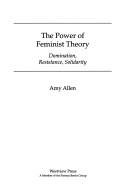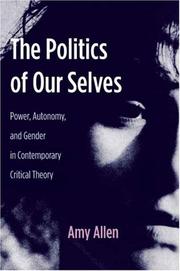| Listing 1 - 10 of 46 | << page >> |
Sort by
|
Book
ISBN: 9780754626947 0754626946 9781315253657 9781351931687 Year: 2008 Publisher: Aldershot Ashgate
Abstract | Keywords | Export | Availability | Bookmark
 Loading...
Loading...Choose an application
- Reference Manager
- EndNote
- RefWorks (Direct export to RefWorks)
Hannah Arendt was one of the most original and influential social and political theorists of the 20th century. This volume brings together the most important English-language essays of the past 30 years on Arendt's unique and lasting contributions to social and political philosophy.
Arendt, Hannah, --- 811 Filosofie --- Arendt, Hannah --- Blücher, Hannah Arendt, --- Bluecher, Hannah Arendt, --- Ārento, Hanna, --- Arendt, H. --- Arendt, Khanna, --- ארנדט, חנה --- アーレント, ハンナ, --- Arendt, Hannah, - 1906-1975 --- Philosophy, German
Book
ISBN: 9780231173247 9780231540636 0231173245 0231540639 Year: 2016 Publisher: New York Columbia University Press
Abstract | Keywords | Export | Availability | Bookmark
 Loading...
Loading...Choose an application
- Reference Manager
- EndNote
- RefWorks (Direct export to RefWorks)
While post- and decolonial theorists have thoroughly debunked the idea of historical progress as a Eurocentric, imperialist, and neocolonialist fallacy, many of the most prominent contemporary thinkers associated with the Frankfurt School—Jürgen Habermas, Axel Honneth, and Rainer Forst—have defended ideas of progress, development, and modernity and have even made such ideas central to their normative claims. Can the Frankfurt School's goal of radical social change survive this critique? And what would a decolonized critical theory look like?Amy Allen fractures critical theory from within by dispensing with its progressive reading of history while retaining its notion of progress as a political imperative, so eloquently defended by Adorno. Critical theory, according to Allen, is the best resource we have for achieving emancipatory social goals. In reimagining a decolonized critical theory after the end of progress, she rescues it from oblivion and gives it a future.

ISBN: 0813365554 9780813365558 Year: 1999 Publisher: Boulder Westview
Abstract | Keywords | Export | Availability | Bookmark
 Loading...
Loading...Choose an application
- Reference Manager
- EndNote
- RefWorks (Direct export to RefWorks)
"In The Power of Feminist Theory, Amy Allen diagnoses the inadequacies of previous feminist conceptions of power and draws on the work of a diverse group of theorists of power, including Michel Foucault, Judith Butler, and Hannah Arendt, in order to construct a new feminist conception of power. Allen illuminates the interrelatedness of domination, resistance, and solidarity, enabling the reader to understand and theorize on these three modalities of power."--Jacket.
Feminist theory --- Power (Social sciences) --- #SBIB:011.GIFTSOC --- #SBIB:316.346H10 --- Empowerment (Social sciences) --- Political power --- Exchange theory (Sociology) --- Political science --- Social sciences --- Sociology --- Consensus (Social sciences) --- Feminism --- Feminist philosophy --- Feminist sociology --- Theory of feminism --- Vrouwenproblematiek, feminisme: algemeen --- Philosophy --- Feminismus. --- Feminist theory. --- Macht. --- Pouvoir (Sciences sociales). --- Power (Social sciences). --- Solidarität. --- Théorie féministe.
Book
ISBN: 9780231173254 Year: 2017 Publisher: New York : Columbia University Press,
Abstract | Keywords | Export | Availability | Bookmark
 Loading...
Loading...Choose an application
- Reference Manager
- EndNote
- RefWorks (Direct export to RefWorks)
While post- and decolonial theorists have thoroughly debunked the idea of historical progress as a Eurocentric, imperialist, and neocolonialist fallacy, many of the most prominent contemporary thinkers associated with the Frankfurt School Jürgen Habermas, Axel Honneth, and Rainer Forst have defended ideas of progress, development, and modernity and have even made such ideas central to their normative claims. Can the Frankfurt School's goal of radical social change survive this critique? And what would a decolonized critical theory look like? Amy Allen fractures critical theory from within by dispensing with its progressive reading of history while retaining its notion of progress as a political imperative, so eloquently defended by Adorno. Critical theory, according to Allen, is the best resource we have for achieving emancipatory social goals. In reimagining a decolonized critical theory after the end of progress, she rescues it from oblivion and gives it a future.--
Book
Year: 2008 Publisher: New York Columbia University Press
Abstract | Keywords | Export | Availability | Bookmark
 Loading...
Loading...Choose an application
- Reference Manager
- EndNote
- RefWorks (Direct export to RefWorks)
Philosophy --- Developmental psychology --- Sociology of the family. Sociology of sexuality --- Feminism --- Gender --- Identity --- Power --- Independence --- Theory --- Book --- Butler, Judith
Digital
ISBN: 9780231173247 9780231540636 Year: 2016 Publisher: New York, N.Y. Columbia University Press
Abstract | Keywords | Export | Availability | Bookmark
 Loading...
Loading...Choose an application
- Reference Manager
- EndNote
- RefWorks (Direct export to RefWorks)
Book
ISBN: 9780231198615 9780231198608 Year: 2021 Publisher: New York Columbia University Press
Abstract | Keywords | Export | Availability | Bookmark
 Loading...
Loading...Choose an application
- Reference Manager
- EndNote
- RefWorks (Direct export to RefWorks)
"Does critical theory still need psychoanalysis? In Critique on the Couch, Amy Allen offers a cogent and convincing defense of its ongoing relevance. Countering the overly rationalist and progressivist interpretations of psychoanalysis put forward by contemporary critical theorists such as Jürgen Habermas and Axel Honneth, Allen argues that the work of Melanie Klein offers an underutilized resource. She draws on Freud, Klein, and Lacan to develop a more realistic strand of psychoanalytic thinking that centers on notions of loss, negativity, ambivalence, and mourning. Far from leading to despair, such an understanding of human subjectivity functions as a foundation of creativity, productive self-transformation, and progressive social change. At a time when critical theorists are increasingly returning to psychoanalytic thought to diagnose the dysfunctions of our politics, this book opens up new ways of understanding the political implications of psychoanalysis while preserving the progressive, emancipatory aims of critique"--

ISBN: 0231136226 9780231136228 Year: 2007 Publisher: New York Columbia university press
Abstract | Keywords | Export | Availability | Bookmark
 Loading...
Loading...Choose an application
- Reference Manager
- EndNote
- RefWorks (Direct export to RefWorks)
Book
ISBN: 0231509847 Year: 2008 Publisher: New York : Columbia University Press,
Abstract | Keywords | Export | Availability | Bookmark
 Loading...
Loading...Choose an application
- Reference Manager
- EndNote
- RefWorks (Direct export to RefWorks)
Some critical theorists understand the self as constituted by power relations, while others insist upon the self's autonomous capacities for critical reflection and deliberate self-transformation. Up to now, it has all too often been assumed that these two understandings of the self are incompatible. In her bold new book, Amy Allen argues that the capacity for autonomy is rooted in the very power relations that constitute the self. Allen's theoretical framework illuminates both aspects of what she calls, following Foucault, the "politics of our selves." It analyzes power in all its depth and complexity, including the complicated phenomenon of subjection, without giving up on the ideal of autonomy. Drawing on original and critical readings of a diverse group of theorists, including Michel Foucault, Jurgen Habermas, Judith Butler, and Seyla Benhabib, Allen shows how the self can be both constituted by power and capable of an autonomous self-constitution. Her argument is a significant and vital contribution to feminist theory and to critical social theory, both of which have long grappled with the relationship between power and agency.If critical theory is to be truly critical, Allen argues, it will have to pay greater attention to the phenomenon of subjection, and will have to think through the challenges that the notion of subjection poses for the critical-theoretical conception of autonomy. In particular, Allen discusses in detail how the normative aspirations of Habermasian critical theory need to be recast in light of Foucault's and Butler's account of subjection. This book is original both in its attempt to think of power and autonomy simultaneously and in its effort to bring the work of Foucault and Habermas into a productive dialogue.
Book
ISBN: 9780231509848 Year: 2007 Publisher: New York, NY
Abstract | Keywords | Export | Availability | Bookmark
 Loading...
Loading...Choose an application
- Reference Manager
- EndNote
- RefWorks (Direct export to RefWorks)
| Listing 1 - 10 of 46 | << page >> |
Sort by
|

 Search
Search Feedback
Feedback About UniCat
About UniCat  Help
Help News
News